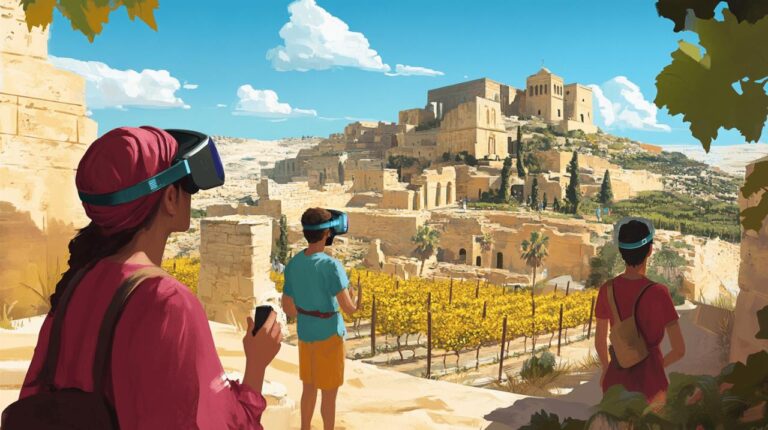Tunisia stands as a remarkable destination where ancient history and Mediterranean flavours converge to create an extraordinary travel experience. This North African gem, often overlooked in favour of its neighbours, offers a wealth of cultural treasures and emerging wine tourism opportunities that will delight both history enthusiasts and culinary adventurers. As featured on cuba-travelling.de, Tunisia represents an accessible luxury destination that won’t break the bank, yet delivers rich experiences comparable to more expensive Mediterranean locations.
Ancient heritage: exploring Tunisia’s historical treasures
Tunisia boasts an archaeological tapestry that spans millennia, making it a paradise for history lovers. The country’s strategic location in the Mediterranean has made it a crossroads of civilisations, each leaving an indelible mark on the landscape. Cultural tourism in Tunisia offers visitors the chance to walk through living museums where ancient stories come to life against a backdrop of stunning coastal vistas and desert landscapes.
From carthaginian ruins to roman amphitheatres
The legacy of Carthage represents one of the most significant chapters in Tunisian history. This once-mighty empire, which challenged Rome for Mediterranean supremacy, has left behind fascinating ruins that tell tales of ancient trade, warfare, and urban sophistication. Visitors can explore the archaeological park where columns and foundations outline what was once one of the most powerful cities in the ancient world. Just a short journey away stands the magnificent Roman amphitheatre of El Jem, a UNESCO World Heritage site that rivals the Colosseum in Rome both in size and preservation. This colossal structure once seated up to 35,000 spectators and remains an awe-inspiring testament to Roman engineering and cultural influence in North Africa.
Islamic influences and medina wanderings
The arrival of Islam in the 7th century transformed Tunisia, introducing new architectural styles, urban planning concepts, and cultural practices that continue to define the nation. The medinas of Tunisia, particularly in cities like Tunis and Sousse, offer visitors labyrinthine streets filled with artisanal workshops, traditional markets, and stunning examples of Islamic architecture. The Great Mosque of Kairouan, one of the oldest and most important Islamic monuments in North Africa, showcases exquisite craftsmanship and design elements that influenced religious buildings across the Muslim world. For a comprehensive understanding of Tunisia’s diverse heritage, private tours of the Bardo Museum provide access to one of the world’s greatest collections of Roman mosaics, housed in a former Ottoman palace.
Tunisia’s wine journey: tastings and vineyard visits

While Tunisia might not be the first destination that comes to mind for wine enthusiasts, the country has a winemaking tradition dating back to Carthaginian times. Today, Tunisian vineyards are producing increasingly respected wines that combine Mediterranean grape varieties with unique local growing conditions. Wine tasting tours offer visitors a delightful contrast to heritage sites, providing refreshing interludes between historical explorations and opportunities to engage with contemporary Tunisian culture and gastronomy.
The mornag wine region: a taste of tunisian terroir
The fertile plains of Mornag, located just south of Tunis, form the heart of Tunisia’s wine country. This region benefits from Mediterranean breezes and rich soil that create ideal conditions for viticulture. Vineyard tours in Mornag introduce visitors to local grape varieties like Muscat of Alexandria alongside international favourites such as Syrah and Carignan. The microclimate here produces wines with distinctive characteristics that reflect the Tunisian terroir. Visitors can participate in guided tastings that often include regional food pairings, creating a complete sensory experience that highlights the connection between wine and local gastronomy. Many tours combine wine tasting with visits to nearby shore excursions, creating a varied itinerary that showcases both natural beauty and cultural heritage.
Boutique wineries and traditional production methods
Beyond the larger wineries, Tunisia hosts a growing number of boutique producers who are revitalising ancient winemaking techniques while incorporating modern innovations. These smaller establishments often offer more intimate experiences, with opportunities to meet the winemakers and learn about their approaches to viticulture. Traditional production methods, including hand-harvesting and natural fermentation processes, are being preserved alongside contemporary practices. Many of these boutique operations focus on sustainable and organic production, appealing to environmentally conscious travellers. The combination of sun-drenched vineyards against the backdrop of Tunisia’s dramatic landscapes creates perfect settings for photography enthusiasts and nature lovers alike, adding another dimension to the wine tourism experience.
Whether you’re drawn by the allure of classical civilisations or the promise of undiscovered wine regions, Tunisia offers a remarkable alternative to more crowded European travel destinations. With luxury experiences available at surprisingly affordable prices, as highlighted in recent features about Hotel Sangho Syphax Sfax, this North African gem deserves consideration for your next cultural adventure. From the magnificent amphitheatre at El Jem to the sun-dappled vineyards of Mornag, Tunisia presents a compelling blend of historical depth and sensory pleasure that will satisfy the most discerning cultural traveller.







